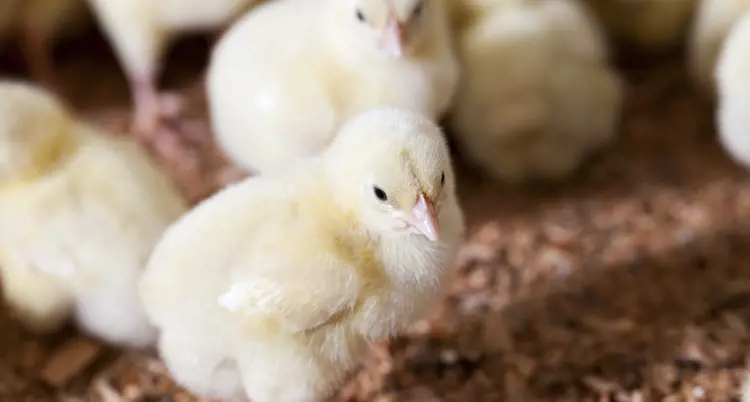Stressors to a modern-day broiler chick during the first 24 hours
Over the last few decades, the poultry industry has made significant advances in broiler chicken production. These birds are now raised at very fast rates to meet the growing global demand for animal proteins. However, this growth comes with its challenges, as modern broiler chicks experience a range of stressors due to intensive farming operations. These stressors can have serious consequences for their health, welfare, and the quality of the meat they produce. Understanding these pressures is crucial for developing more sustainable and humane poultry- raising techniques.

Rising need for maximum output per square
Broiler chicks are often housed in confined spaces to maximize floor area and increase production, leading to fierce competition for resources such as food, water, and space. In many cases, no additional feeding or drinking areas, such as chick paper, chick trays, or chick fountains, are
provided. High stocking densities in broiler farming may seem manageable initially because the chicks are small, but the impact becomes evident as they grow, leading to body size variation. This can result in increased aggression, heightened stress levels, and a higher risk of disease transmission. Crowded conditions not only threaten the well-being of broiler chicks but also make it difficult to maintain good health and uniform growth rates.

Rapid growth supported by good nutrition
Selective breeding and nutrient-rich diets have enabled the rapid growth of broiler chicks. These birds require ad libitum access to feed, water, and an optimal environment for healthy growth and development. Inconsistent feeding, poor-quality feed, or limited access to clean water can lead to malnutrition, dehydration, and stunted growth.
However, this rapid growth has consequences. Some traits are selected at the expense of others, as the accelerated development of muscle mass often outpaces the growth of skeletal and cardiovascular systems, leading to health problems. Common issues include leg deformities, heart conditions, and reduced mobility, which ultimately affect the birds' quality of life. While these traits are beneficial for meat production, they raise ethical concerns about the long- term impact on the birds' well-being.
Environmental factors: An invisible threat
Environmental factors play a significant role in broiler chick welfare. Chicks are hatched without the ability to regulate their body temperature, so without proper temperature control, their health can be compromised. Temperature fluctuations cause considerable stress and discomfort, leading to poor growth and increased mortality rates. Even a deviation of ±3°C from the desired temperature curve (see Graph 1) can cause problems.
Graph 1: Growth curve of broiler chicks with live mass, feed intake, and temperature over time
Cold-stressed chicks tend to huddle together for warmth, increasing the risk of suffocation. A colder environment slows down their metabolism, leading to poor feed conversion and stunted growth. Cold-stressed chicks are also more vulnerable to illnesses due to weakened immune systems. Conversely, when exposed to high ambient temperatures, broiler chicks spread their wings, pant, and eat less to cool off. Heat stress can lead to rapid dehydration, electrolyte imbalances, and poor digestion, resulting in slower growth, lethargy, and higher mortality rates.
Inappropriate lighting can also cause stress by disrupting the birds' natural behaviors. Inconsistent or inadequate lighting can affect their eating habits, sleeping patterns, and overall health. Additionally, poor ventilation and excessive ammonia levels from droppings can lead to respiratory issues, further compromising the chicks' health.
Handling and noise stress
Broiler farming involves unavoidable handling and transportation activities. Chicks are frequently handled during vaccination, sorting, and transport between facilities before they are placed on the house floor. While necessary, these actions can be highly stressful and may cause physical harm. Transportation, in particular, causes significant stress as the birds are exposed to unfamiliar environments, temperature fluctuations, and long periods of confinement. The distance from the hatchery to the farm can further contribute to the chicks' stress levels. These stressors may weaken the immune system, making the birds more susceptible to disease and lowering their overall health.
Noise and frequent human activity are often overlooked as stressors for broiler chicks. Loud noises, sudden disturbances, and continuous human presence can startle the birds, increasing their heart rate and stress levels. This heightened stress response can reduce feeding efficiency and negatively impact growth and development. Broiler chicks are social animals, and any changes to their social environment can be highly stressful. Alterations such as introducing new birds, changing group sizes, or disrupting the pecking order can lead to increased aggression and behavioral issues. These social pressures can negatively affect flock harmony, leading to more injuries and a lower overall level of well-being for the birds.
Conclusion
The welfare of modern broiler chicks is a complex issue that requires careful consideration of many stressors. From high stocking densities and rapid growth to environmental and genetic challenges, these birds face numerous stressors that can significantly impact their health and well-being. Addressing these challenges is essential for improving animal welfare, as well as ensuring the long-term sustainability and productivity of the poultry industry. As consumers and industry stakeholders become increasingly aware of these issues, there is a growing need for more humane and sustainable farming practices that prioritize the welfare of broiler chicks.
For more information on broiler production and management, please contact your De Heus technical advisor - https://www.deheus.co.za/meet-our-team
